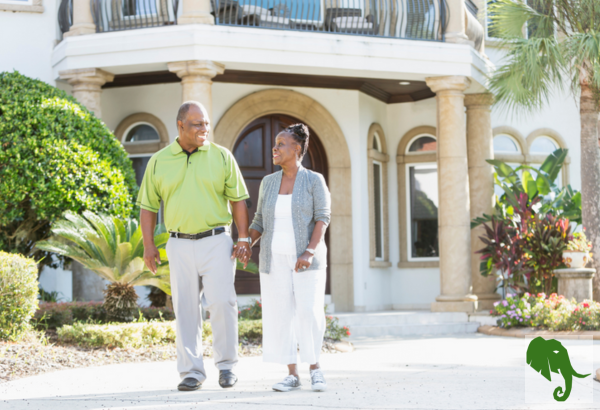I left my parents’ home at a young age to join the service and see the world. During my time away, my parents were active travelers, visiting tourist attractions across the states, exploring various casinos, and taking cruises throughout the Caribbean. They were truly active. However, towards the end of my tour, I noticed a change — they were less active and preferred staying home. They attributed it to feeling tired, but I later discovered their health was declining, making them less mobile.
Over the years, I saw my parents aging but didn’t give it much thought until my mother suffered several strokes and my stepfather started having mobility issues. One visit to my home highlighted the severity of their situation: my stepfather had a significant bruise on his face from falling in their driveway. After this incident, I became more attentive, visited them more often, and eventually moved them closer to me to provide better care.
Nothing prepared me for the next six years of watching my parents deteriorate and eventually pass away. It was a life-changing experience and a real eye-opener. I learned a lot about the unique risks to senior citizens and senior safety from nurses, doctors, and social workers. This knowledge helped me retain their independence, maintain their mental health, and ensure their safety.
There are numerous areas of concern when it comes to senior safety, particularly regarding identity fraud, home hazards, personal threats, and cognitive decline. This post will focus on three major areas: understanding cognitive loss, preventing home hazards, and protecting against financial fraud.
Understanding Cognitive Loss
As we age, our cognitive functions often begin to decline. This can manifest in various ways, such as memory loss, decreased attention span, and reduced problem-solving skills. Cognitive decline is not inevitable, but it’s a common aspect of aging that can be mitigated with proactive measures.
My parents, once sharp-witted and active, began to lose their cognitive edge. The adage “if you don’t use it, you lose it” became evident. Older adults can maintain cognitive health through physical activity, mental exercises, and social interactions. Regular exercise, such as walking and balance exercises, can help maintain brain function and prevent falls. Engaging in new activities like gardening, dancing, or swimming can help keep the body fit and the mind active.
Other effective ways to fight cognitive decline are through mental exercises. Activities that challenge the brain, such as solving word puzzles, reading, or learning a new hobby can help slow memory loss. Encouraging your loved ones to participate in these activities regularly can have a significant positive impact on their cognitive health. My mother and I put together a lot of picture puzzles which she thoroughly enjoyed.
Staying socially active is crucial. Because the internet can be confusing for the elderly and makes them susceptible to scams, in-person social activities are more beneficial. Joining a senior yoga class, getting involved in community activities, or becoming a member of a local senior center can help maintain cognitive health and provide social interaction.
Preventing Home Hazards
Home safety is a critical aspect of caring for elderly loved ones. Falls are a leading cause of injury among seniors, and many of these accidents happen at home. By making some modifications, you can significantly reduce the risk of falls and other accidents.
One of the most common places for falls among seniors is the bathroom. My mother experienced this firsthand when she fell trying to step into the shower. After this incident, I took several steps to make their apartment safer, such as installing grip bars in the shower and near the toilet, placing a rubber mat in the shower, installing a raised toilet seat, and providing a transition chair for the shower.
Other areas of the house also need attention. To prevent falls, I secured loose rugs with non-skid backing or tape, or remove them if they were unnecessary. I moved furniture out of walkways to avoid bumps and falls. I also made sure that all areas of the house, especially the staircases and entryways, are well-lit. Replace dim bulbs with brighter ones and install night lights in hallways and bathrooms.
Clutter is another significant hazard. Keeping floors clear of unnecessary items and ensuring that frequently used items are within easy reach can help avoid them from unnecessary bending or stretching. I also organized cables and power cords to prevent tripping. If possible, consider rearranging their living space to create a more open and accessible environment.
In addition to fall prevention, fire safety is crucial. I tested the smoke detectors and carbon monoxide detectors to make sure they were functioning correctly. Be certain to test these devices regularly and replace batteries as needed. Educate your loved ones on the importance of not overloading electrical outlets and the safe use of appliances. My stepfather was notorious for over crowding power strips.
Protecting Against Financial Fraud and Abuse
Financial fraud and abuse are significant concerns for the elderly. Scammers often target seniors because they believe them to be more trusting and less familiar with modern technology. Protecting your loved ones from financial fraud requires vigilance and education.
My stepfather was very friendly and often fell prey to scammers. I once interrupted him just as he was about to give out personal information for a fake burial expense coverage. Scammers frequently target the elderly for identity theft by tricking them into providing personal information like social security numbers, credit card details, and more.
Educating elderly loved ones about these scams is crucial. Blocking unknown numbers on their phones and registering their numbers on the Federal Trade Commission’s National “Do Not Call Registry” can help. If they use the internet, teach them to be cautious about sharing personal information and clicking on suspicious links. Using security software and multifactor authentication can add extra layers of protection.
Financial abuse by family members or close friends is another concern. To prevent this, limit access to bank accounts and credit cards, keep sensitive information in a safe place, frequently review credit reports, and lock them to prevent unauthorized inquiries. Ensure a trusted person monitors their finances and considers obtaining a power of attorney, if necessary, while discussing this with the family to avoid misuse.
Encourage your loved ones to regularly review their bank and credit card statements. Any unfamiliar charges should be investigated immediately. Setting up alerts for large transactions can also help monitor their accounts.
Additionally, consider enrolling them in identity theft protection services, which can provide an extra layer of security.
Lastly, foster an open line of communication. Make sure your loved ones feel comfortable discussing their financial matters with you. Regularly check in with them about any suspicious calls, emails, or letters they receive. Reassure them that it’s okay to ask for help and that protecting their financial well-being is a priority.
Conclusion
Protecting our elderly loved ones from all threats can be overwhelming. However, through preventive measures and education, we can minimize these risks and provide peace of mind. Understanding cognitive decline, addressing home hazards, and safeguarding against financial fraud are crucial steps in ensuring the safety and well-being of our senior family members.
By staying informed and proactive, we can help our elderly loved ones maintain their independence and enjoy their golden years safely. Remember, the cycle of life is real, and one day, we too may need the same care and protection.
Taking these steps not only enhances their quality of life but also strengthens the bonds of love and trust within the family. Let’s commit to making their twilight years as safe, comfortable, and joyous as possible.
Related Content
 Pin
PinRead other OwnGuard Solutions blog posts
Read our other posts centered around being safer and better prepared.


